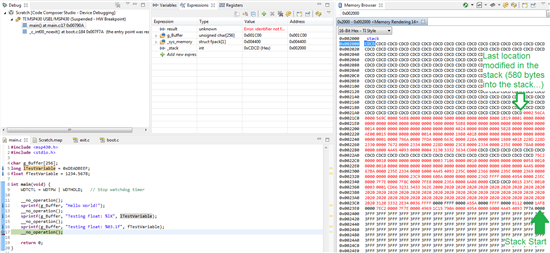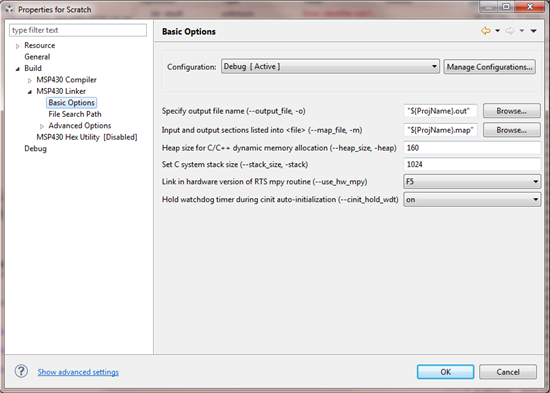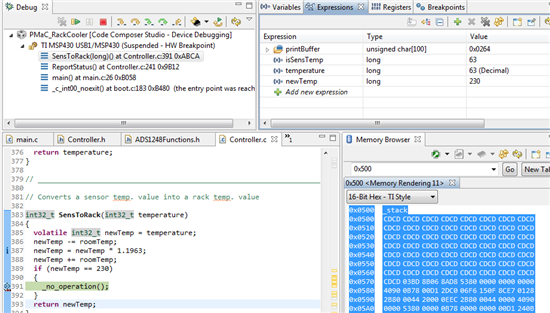Hi guys,
I'm facing a very strange behavior with a project of mine based on the MSP430F2274.
The bug shows off once in a while, here are the functions related to it:
// ____________________________________________________________________________
//Reports the actual temperatures and the PWM values.
void ReportStatus()
{
sprintf((char *) printBuffer,
"Sens. Temp.: %03.1f\t Estimated Rack Temp.: %03.1f"
"\tPWM1: %+4d\r", ((float) isSensTemp) / 10, ((float) SensToRack(isSensTemp)) / 10,
PWM1Value);
Print((char *) printBuffer);
}
// ____________________________________________________________________________
// Transmit the given character array over the UART.
void Print(char * array)
{
char * iterator;
for (iterator = array; *iterator != '\0'; ++iterator)
{
while (!(IFG2 & UCA0TXIFG))
; // Wait until the tx buffer is empty
UCA0TXBUF = *iterator; // Put character in the tx buffer
}
while (!(IFG2 & UCA0TXIFG))
; // Wait until the tx buffer is empty
}
// ____________________________________________________________________________
// Converts a sensor temp. value into a rack temp. value
int32_t SensToRack(int32_t temperature)
{
return roomTemp + (temperature - roomTemp) * 1.1963;
}
int main(void)
{
ConfigureUART();
ConfigurePeltier();
InitVariables();
ADS_ConfigureADS();
while (1)
{
if (cmdFlag == CMD_available)
{
cmdFlag = CMD_empty;
ParseCommand();
}
if (control == ctrl_loop)
{
isSensTemp = ADS_FetchTemperature();
CalculatePWM();
ApplyPWM();
if (reportFlag == rep_report)
{
reportFlag = rep_blank;
ReportStatus();
}
control = ctrl_running;
}
}
}
// UART Rx interrupt routine
#pragma vector=USCIAB0RX_VECTOR
__interrupt void USCI0RX_ISR(void)
{
// Add characters
if (UCA0RXBUF != '\r')
{
*rxPtr = UCA0RXBUF;
++rxPtr;
if (rxPtr - rxBuffer > 99) rxPtr = rxBuffer;
}
else
{
// Command is gathered.
*rxPtr = '\0';
rxPtr = rxBuffer;
strcpy((char *) cmdBuffer, (char *) rxBuffer);
// Set Flag and clear any low power mode.
cmdFlag = CMD_available;
}
}
#pragma vector=PORT2_VECTOR
__interrupt void PORT2_ISR(void)
{
if (P2IFG & BIT1)
{
// DRDY (ADS1246/7/8) interrupt routine
P2IFG &= ~BIT1;
if (ADS_status == ADS_cont_measuring && control == ctrl_running) control =
ctrl_loop;
if (ADS_status == ADS_measuring || ADS_status == ADS_calibrating) __bic_SR_register_on_exit(
CPUOFF);
}
}
During operation, I sometimes get such a line.
Sens. Temp.: 6.6 Estimated Rack Temp.: 23.0 PWM1: -424
So, we know that the isSensTemp = 66.
roomTemp = 230 always (const)
But SensToRack(isSensTemp) seems to yield 230
instead of 230 + (66-230) * 1.1963 = 33.
My guess, is maybe the way the return statement is written causes a problem ?
If somehow an interrupt happens at that precise moment where the return statement has to be made ?
Anybody can guess what I'm doing wrong ?
Thanks a lot for your help.
Nessim




